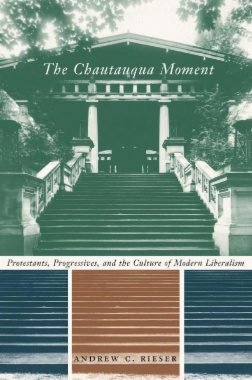This book traces the rise and decline of what Theodore Roosevelt once called the "most American thing in America." The Chautauqua movement began in 1874 on the shores of Chautauqua Lake in western New York. More than a college or a summer resort or a religious assembly, it was a composite of all of these—completely derivative yet brilliantly innovative. For five decades, Chautauqua dominated adult education and reached millions with its summer assemblies, reading clubs, and traveling circuits.
Scholars have long struggled to make sense of Chautauqua's pervasive yet disorganized presence in American life. In this critical study, Andrew Rieser weaves the threads of Chautauqua into a single story and places it at the vital center of fin de siècle cultural and political history. Famous for its commitment to democracy, women's rights, and social justice, Chautauqua was nonetheless blind to issues of class and race. How could something that trumpeted democracy be so undemocratic in practice? The answer, Rieser argues, lies in the historical experience of the white, Protestant middle classes, who struggled to reconcile their parochial interests with radically new ideas about social progress and the state. The Chautauqua Moment brings color to a colorless demographic and spins a fascinating tale of modern liberalism's ambivalent but enduring cultural legacy.
- Contents
- Acknowledgments
- Introduction: Chautauqua's Liberal Creed
- 1. An American Forum: Methodist Camp Meetings and the Rise of Social Christianity
- Camp Meetings and Terra Spiritualis
- Never on Sunday
- From Far Points to Fair Point
- Conclusion
- 2. The Never-ending Vacation: Boosters, Tourists, and the Fantasyscape of Chautauqua
- Nature Worship and Stealth Cosmopolitanism
- Better Than a Mill: The Booster’s Chautauqua
- Railroads Redux
- Magic Lands
- The Never-ending Vacation: Chautauqua Suburbs
- Conclusion
- 3. Canopy of Culture: Democracy under the Big Tent of Prosperity
- Conclusion
- Lewis Miller: Communitarian Philanthropist
- John Heyl Vincent: Chautauqua Patriarch
- The Lyceum and Mechanics’ Institutes
- Chautauqua Literary and Scientific Circle
- Jasper Douthit: Chautauqua’s Political Turn
- Joseph Maximilian Hark: Moravian for Middlebrow Culture
- Catholics Respond
- 4. The Liberalism of Whiteness: Webs of Region, Race, and Nationalism in the Chautauqua Movement
- From Anglo-Saxonism to White Americanism
- Chautauqua and the Midwest
- An Invitation to the White South
- Racial Patriotism and the Spanish-American War
- Progressivism and the Black Presence at Chautauqua
- Lessons in Orientalism
- Conclusion
- 5. From Parlor to Politics: Chautauqua and the Institutionalization of Middle-Class Womanhood
- Who Belonged to the Chautauqua Literary and Scientific Circle?
- Men in the Minority
- The Fraternity of Intellect
- Integrating the CLSC
- From Temperance to Suffrage
- Chautauqua Novels
- Women as Managers: Kate Kimball’s Bureaucracy
- “Women’s Clatter” in the Public Sphere
- Conclusion
- 6. Useful Knowledge and Its Critics: The Messiness of Popular Educatoin in the 1890s
- Chautauqua and the University Extension Movement
- Revolt of the Intellectuals
- “I Like Something Doing”: Masculinities at Chautauqua
- Delsarte and the Natural Expression Movement
- Business, Correspondence, and Normal Schools
- Conclusion
- 7. Success through Failure: Chautauqua in the Progressive Era
- The Ambiguous Career of City Beautiful
- Libraries, Parks, and Lecture Series
- The Trouble with the Assemblies
- The Theater of Politics in the Progressive Era
- Departure of the Fundamentalists
- Circuit Chautauquas and the Corporate Reorganization of Culture
- From Liberal Creed to Secular Liberalism: Shelbyville, Illinois
- The Great War and the Agony of the Circuits
- Conclusion
- Conclusion: Failure Through Success?
- Appendix A: Independent Chautauqua Assemblies Founded 1874-1899
- Appendix B: CLSC Incoming Class Enrollment and Graduates, 1874-1914
- Abbreviations
- Notes
- Bibliography
- Index

